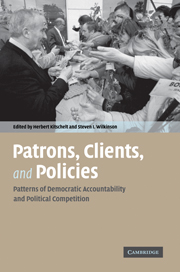Book contents
- Frontmatter
- Contents
- List of figures
- List of tables
- Acknowledgments
- List of contributors
- 1 Citizen–politician linkages: an introduction
- 2 Meet the new boss, same as the old boss? The evolution of political clientelism in Africa
- 3 Monopoly and monitoring: an approach to political clientelism
- 4 Counting heads: a theory of voter and elite behavior in patronage democracies
- 5 Explaining changing patterns of party–voter linkages in India
- 6 Politics in the middle: mediating relationships between the citizens and the state in rural North India
- 7 Rethinking economics and institutions: the voter's dilemma and democratic accountability
- 8 Clientelism and portfolio diversification: a model of electoral investment with applications to Mexico
- 9 From populism to clientelism? The transformation of labor-based party linkages in Latin America
- 10 Correlates of clientelism: political economy, politicized ethnicity, and post-communist transition
- 11 Political institutions and linkage strategies
- 12 Clientelism in Japan: the importance and limits of institutional explanations
- 13 The demise of clientelism in affluent capitalist democracies
- 14 A research agenda for the study of citizen–politician linkages and democratic accountability
- References
- Index
10 - Correlates of clientelism: political economy, politicized ethnicity, and post-communist transition
Published online by Cambridge University Press: 27 October 2009
- Frontmatter
- Contents
- List of figures
- List of tables
- Acknowledgments
- List of contributors
- 1 Citizen–politician linkages: an introduction
- 2 Meet the new boss, same as the old boss? The evolution of political clientelism in Africa
- 3 Monopoly and monitoring: an approach to political clientelism
- 4 Counting heads: a theory of voter and elite behavior in patronage democracies
- 5 Explaining changing patterns of party–voter linkages in India
- 6 Politics in the middle: mediating relationships between the citizens and the state in rural North India
- 7 Rethinking economics and institutions: the voter's dilemma and democratic accountability
- 8 Clientelism and portfolio diversification: a model of electoral investment with applications to Mexico
- 9 From populism to clientelism? The transformation of labor-based party linkages in Latin America
- 10 Correlates of clientelism: political economy, politicized ethnicity, and post-communist transition
- 11 Political institutions and linkage strategies
- 12 Clientelism in Japan: the importance and limits of institutional explanations
- 13 The demise of clientelism in affluent capitalist democracies
- 14 A research agenda for the study of citizen–politician linkages and democratic accountability
- References
- Index
Summary
Why do some countries emerging from autocratic rule feature competition between strong programmatic parties while others become preserves of clientelism? The present chapter contributes to an answer in several ways. First, it urges social scientists to think of clientelistic electoral competition not only in terms of clientelistic parties but also in terms of important non-party forms of political organization (party substitutes) that can constitute extreme manifestations of clientelistic linkage between voters and politicians in some new democracies but that are typically overlooked in studies that focus on parties alone. Second, it stresses that the strength of clientelistic politics can vary widely within a single state and that we can learn much by studying such variation, holding constant country-level variables. Third, it combines these approaches to test key elements of the general theory of clientelism developed by Kitschelt and Wilkinson in this volume's Introduction. Specifically, it takes advantage of a quasi-experimental opportunity presented by the Russian Federation, applying statistical analysis to an original database so as to understand why highly clientelistic provincial political machines are more powerful in some of Russia's eighty-nine regions than in others.
With minor exceptions, the results broadly support the volume's theoretical approach, indicating that on the whole the strongest degrees of regional clientelism are found where the attributes of economic development and political competition are lowest, where the state can most easily monitor and single out for punishment particular economic sectors, and where ethnocultural networks are politicized.
- Type
- Chapter
- Information
- Patrons, Clients and PoliciesPatterns of Democratic Accountability and Political Competition, pp. 227 - 250Publisher: Cambridge University PressPrint publication year: 2007
- 30
- Cited by



